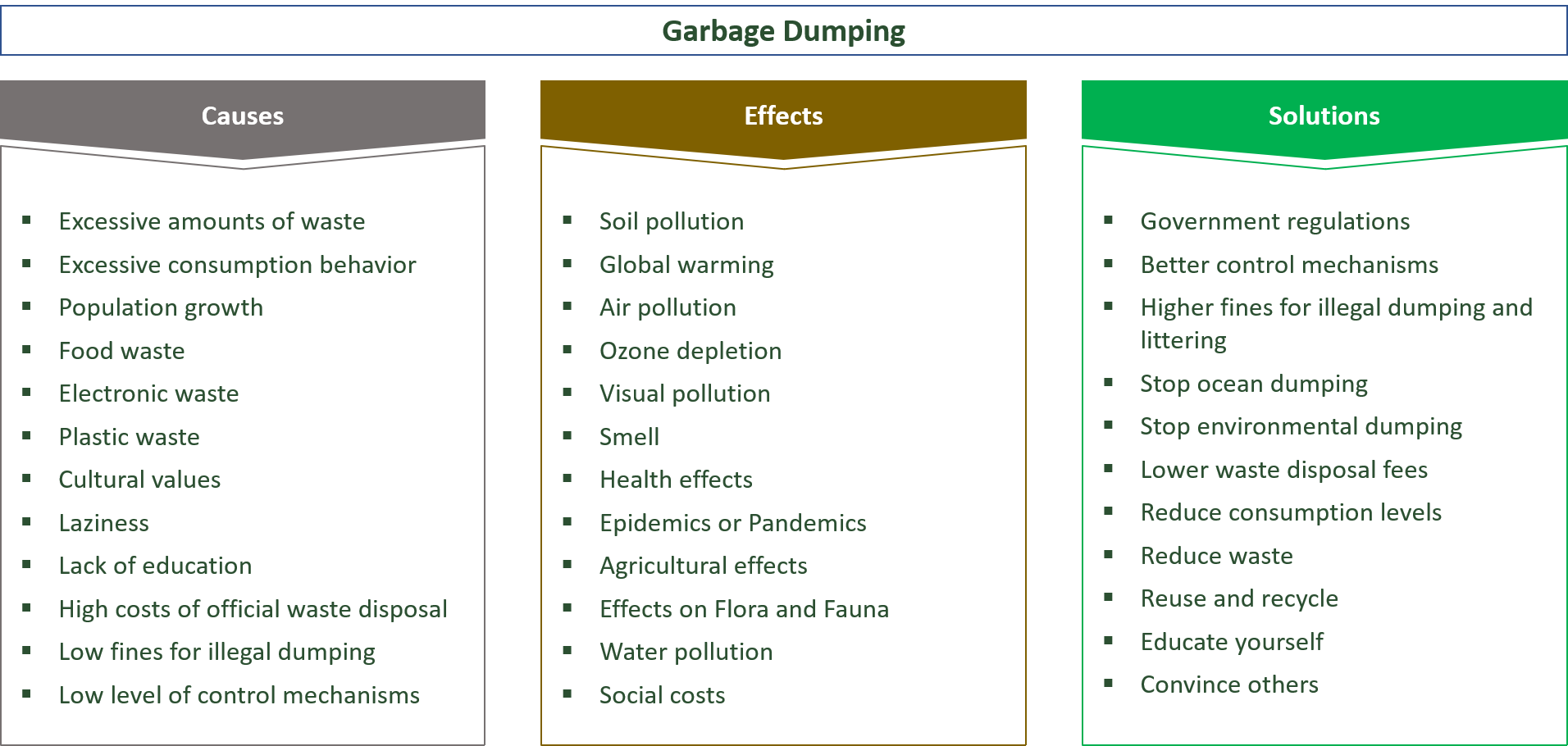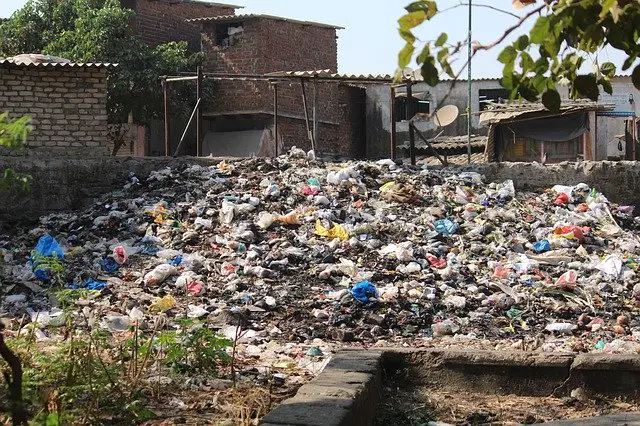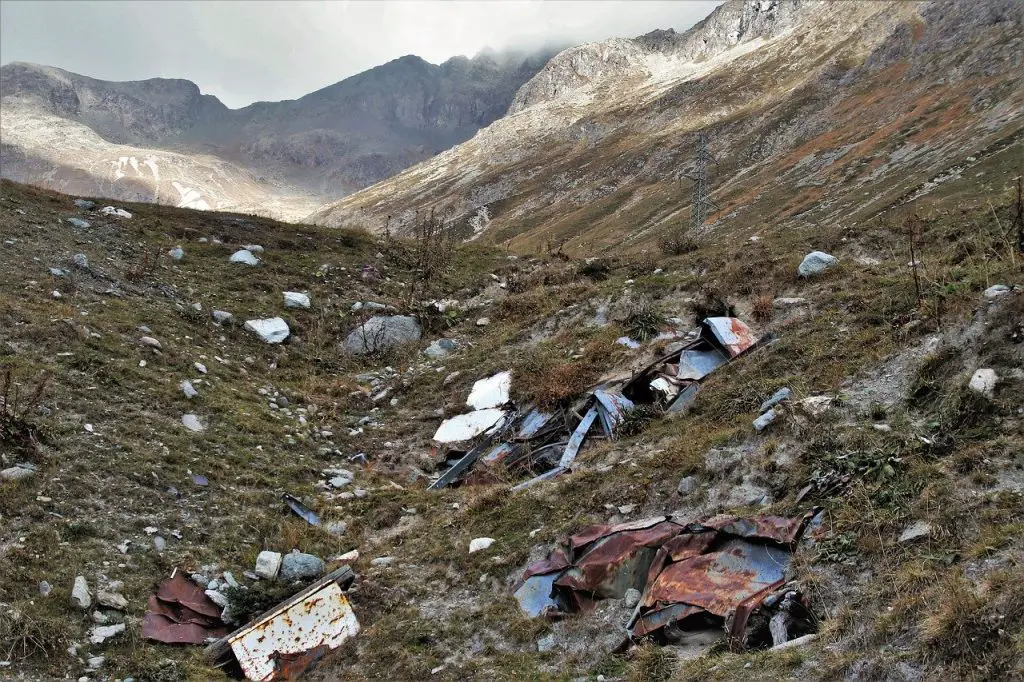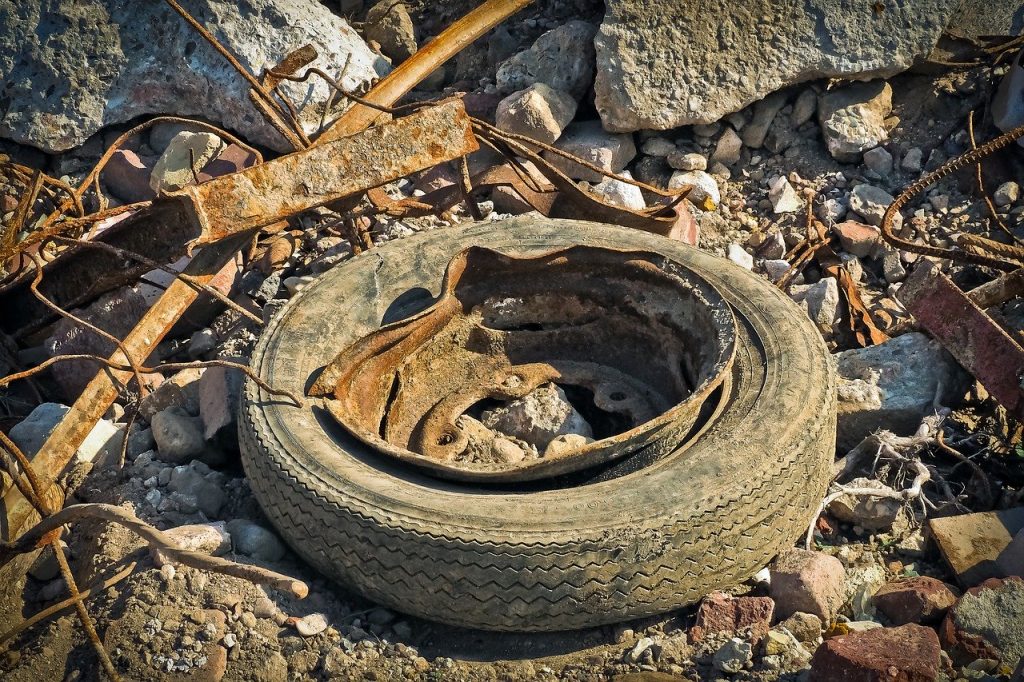“My wife is always trying to get rid of me. The other day she told me to put the garbage out. I said to her I already did. She told me to go and keep an eye on it.”
Rodney Dangerfield, Comedian
Garbage Dumping: Types, Causes, Effects & Solutions

Garbage dumping (often also referred to as trash dumping) can be defined as the process of getting rid of all kinds of waste.
This includes different types of trash dumping.
Waste can be either dumped legally or illegally. Illegal dumping practices can be quite harmful to our environmental system since it imposes several kinds of negative effects on the flora and fauna as well as on our oceans.
In the following, the types, causes, effects and solutions regarding the dumping of garbage are examined.
Audio Lesson
Contents
Types of Trash Dumping
- Legal dumping
- Illegal dumping
- Ocean dumping
- Littering
- Environmental dumping
Legal dumping
Legal dumping can be defined as all kinds of waste dumping that are not forbidden by law.
For example, there are waste disposal sites where you can dump your electronic waste or other kinds of waste items.
Legal dumping is an efficient way to get rid of your trash and can also be regarded as the best waste disposal method compared to the alternatives.
Illegal dumping
Illegal dumping is a big problem for our ecosystems. It is practiced in many developing countries.
Industries in these countries often dispose of their trash in nearby rivers or lakes to get rid of the waste, thus contaminating the water and also hurting fishes and other water animals and plants.
Therefore, illegal dumping can be quite harmful to our environmental system and should be avoided at all costs.
Ocean dumping
In the past decades, it was quite common to dispose of all sorts of waste in our oceans, including highly toxic and even radioactive waste.
Many companies just disposed of waste contaminated with heavy metals or other harmful substances into our oceans in order to get rid of them.
Since 1972, in the United States, rules for ocean dumping became stricter and the disposal of harmful substances in the ocean has been prohibited.
However, in many countries worldwide, ocean dumping is not regulated in a sufficient manner and therefore large amounts of harmful or even toxic material are still dumped into our oceans, with significant harmful effects on marine life of all sorts.
Littering
Littering is not considered to be a big environmental problem by many people in our society, however, it can have significant adverse effects on the local flora and fauna.
For example, used cigarettes are often disposed of on the ground instead of disposing them in trash bins.
This can lead to soil pollution and may also have harmful effects on animals trying to eat the used cigarettes.
Moreover, the disposal of used cigarettes is the cause of many wildfires each year.
Therefore, the prevention of littering can mitigate several kinds of environmental issues.
Environmental dumping
Environmental dumping can be defined as the process of transferring waste from one country to another in order to get rid of a country’s waste and to take advantage of countries that have less strict laws regarding waste disposal.
Environmental dumping makes it possible for companies or countries to get rid of their waste in a cheap way.
Environmental dumping can have severe adverse effects for the waste-receiving countries since they may simply be overwhelmed by the amounts of trash which can lead to significant pollution of many sorts and may also lead to the spread of diseases due to unhygienic conditions.

Causes for Garbage Dumping
- Excessive amounts of waste
- Excessive consumption behavior
- Population growth
- Food waste
- Electronic waste
- Plastic waste
- Cultural values
- Laziness
- Lack of education
- High costs of official waste disposal
- Low fines for illegal dumping
- Low level of control mechanisms
Excessive amounts of waste
Over the last decades, worldwide consumption levels increased to a quite high level.
However, this also implies a significant increase in the amount of waste.
Many of our material things are also covered or wrapped into plastic, which further exacerbates the problem of waste production.
In order to get rid of this waste, it has to be dumped and disposed of somehow.
A significant fraction of waste is dumped into landfills, where it will eventually rot and decompose.
Excessive consumption behavior
In our nowadays society, especially in the Western world, people often strive for the newest versions of stuff.
For instance, everyone wants to have the newest smartphone, the hippest clothes and so on.
This consumption behavior leads to significant amounts of waste since old but still working items are used only for short times before disposing them into the trash bin.
Making things worse, people in third world countries now become richer and aspire to similar kinds of lifestyles.
This will likely exacerbate the problem of excessive consumption and waste production up to a point where many countries will simply drown in waste.
Population growth
Population growth is another factor when it comes to an increase in waste production and the related dumping issues.
A growing world population also implies an increase in waste production which in turn hurts our environmental system in a significant manner.
Food waste
In our nowadays society, especially in the Western world, it is quite common that significant amounts of food are not consumed but disposed of into the trash bin.
People often think that when the best-before date is reached, food is no longer suitable for consumption.
In fact, even after the best-before date has been exceeded, many food items would still be consumable.
Moreover, people also often buy too much food and are not able to consume all of it in time.
Therefore, also food waste can contribute a significant part to the dumping problem.
Electronic waste
Since our world becomes highly technologized, electronics constitute a big part of our overall consumption spending.
However, this consumption behavior also implies the production of significant amounts of electronic waste.
Electronics, especially smartphones, are replaced quite frequently since everyone wants to have the newest version.
This leads to enormous amounts of electronic waste which in turn has to be dumped or disposed of somehow.
Plastic waste
A big fraction of our material things are wrapped or packaged into plastic when we buy them in conventional stores.
Since plastic packaging is quite cheap and easy to handle, it is the preferred packaging method for companies.
However, the amount of plastic waste produced every day is shocking.
Moreover, it is estimated that every year, 500 billion disposable plastic cups are used.
Imagine what this means for the overall amount of plastic waste that is produced!
Therefore, plastic waste is a significant source for overall waste production and for the resulting dumping issues.
Cultural values
People are often guided through cultural values when it comes to decision-making processes.
In countries where illegal dumping or littering is not considered a big deal, people are much more likely to pollute the environment since they just do not feel guilty since everyone is doing it.
Thus, cultural values can play a big role when it comes to individual actions regarding proper or improper waste disposal and dumping.
Laziness
A fraction of our society can also be considered lazy when it comes to the correct disposal of waste.
Many people simply do not care enough about our environment and are therefore not willing to get rid of their waste in an ecologically-friendly manner if they have to take any efforts.
Therefore, laziness can prevent people from disposing of their waste appropriately and can therefore lead to illegal dumping or littering.
Lack of education
Many people simply do not know how important proper waste disposal really is for our planet since no one ever taught them about it.
These people just do what is most convenient for them to get rid of their trash.
This could mean that harmful materials like batteries are disposed of into conventional trash, which can lead to adverse environmental effects due to the harmful substances contained in batteries.
High costs of official waste disposal
In some countries, the disposal of waste on official waste disposal sites can be quite costly compared to the average income.
Therefore, people may refrain to use these disposal sites and rather go for illegal dumping practices in order to get rid of their trash.
Low fines for illegal dumping
In many countries, there may also be low fines for illegal dumping.
This gives people and industries the incentive to dump their trash in an illegal manner since they know that they are not fined in a way that would hurt them financially.
Low level of control mechanisms
There are also quite low control mechanisms in many regions.
Thus, people do not have to fear fines for illegal dumping since they know that the probability that they are exposed is quite low.
This also leads to an incentive for people to dispose of their trash illegally.

Effects of Waste Dumping
- Soil pollution
- Global warming
- Air pollution
- Ozone depletion
- Visual pollution
- Smell
- Health effects
- Epidemics or Pandemics
- Agricultural effects
- Effects on Flora and Fauna
- Water pollution
- Social costs
Soil pollution
Incorrect or illegal dumping of waste can lead to significant soil pollution.
For example, if industries just dispose of their garbage in nearby forests, the surrounding soil can get polluted with harmful substances.
Moreover, if the trash is disposed of properly into landfills but the landfills itself are leaking, this could also lead to serious soil pollution.
Global warming
Waste production and the implied dumping can also lead to global warming.
Since a significant fraction of the waste is burned, harmful substances, including greenhouse gases, are emitted into the air.
The emission of greenhouse gases like methane or carbon dioxide contributes to global warming and to the implied adverse effects.
Air pollution
Dumping, even if it is done in a legal manner, can lead to significant air pollution.
A big fraction of the produced waste is burned.
In the combustion process, harmful substances are emitted into the air, which can cause significant air pollution and can also lead to particle pollution which may in turn lead to health issues of many sorts.
Ozone depletion
The combustion of waste can also contribute to the depletion of the ozone layer.
Since in the combustion process of waste, many harmful chemicals are released into the atmosphere, some of these chemicals can harm the ozone layer and therefore can lead to ozone layer depletion.
Visual pollution
The dumping of waste, especially illegal dumping in nature, can cause significant visual pollution.
Imagine you are hiking in a nice forest in the mountain area.
You feel connected to nature and love the feeling.
However, after a while, you come to a spot where the beautiful nature is polluted with trash.
Would this improve your nature experience? I don’t think so!
Therefore, illegal dumping may lead to significant visual pollution which may in turn adversely impact the living quality of people.
Smell
Dumping can also lead to significant and unpleasant levels of smell.
This is especially true for organic waste.
If organic waste is not disposed of properly, it can lead to significant odor nuisance.
Especially in areas in which the dumping of organic waste next to streets is a big issue, residents may suffer from significant smell.
Health effects
Illegal dumping can also lead to serious health effects.
When trash that contains harmful or even toxic components is dumped into nature, these harmful substances can enter the food chain and may eventually end up in our food which in turn can lead to adverse public health effects.
Epidemics or Pandemics
In areas with a high level of illegal dumping, the spread of epidemics or even pandemics becomes more likely since waste can be a breeding ground for many dangerous diseases.
By providing bacteria with those breeding grounds, they are more likely to grow in population and may infect many people.
Eventually, in countries with low hygienic standards, these diseases may even spread across borders and may lead to the death of many people.
Agricultural effects
Illegal dumping can also affect agriculture in an adverse manner.
If there is too much dumping of harmful substances in nature, nearby fields and the soil are likely to become contaminated with harmful components.
This in turn can lead to a decrease in crop yields and may also affect the growth behavior of plants.
Effects on Flora and Fauna
Dumping in nature can also lead to significant adverse effects for the local flora and fauna.
Animals and plants usually are quite sensitive to their natural living conditions.
If these conditions are altered through incorrect waste disposal, many animals and plants will not be able to adjust to these new conditions and their populations may decrease.
Water pollution
Water pollution can either be caused by illegal dumping or also by ocean dumping.
By dumping waste illegally into rivers or lakes, the water and also many water organisms may be contaminated with harmful substances.
Through ocean dumping, many harmful or even toxic substances are released into our oceans, which in turn has significant effects on several water organisms.
Social costs
There are also many costs that are related to incorrect or illegal dumping.
Private companies may not take social costs of pollution into account, which may lead to excessive dumping in natural habitats and therefore to the destruction of the living space for many animals and plants.
Since private companies usually behave profit-maximizing, they will not care about the social costs since they only take their private costs into account.
Therefore, in order to prevent this behavior, we have to make sure that the negative externalities imposed by industries on nature are fined higher in order to prevent these harmful industrial dumping actions.

Solutions for Trash Dumping
- Government regulations
- Better control mechanisms
- Higher fines for illegal dumping and littering
- Stop ocean dumping
- Stop environmental dumping
- Lower waste disposal fees
- Reduce consumption levels
- Reduce waste
- Reuse and recycle
- Educate yourself
- Convince others
Government regulations
Governments all over the world have to regulate waste management and waste disposal more strictly.
This includes prevention measures regarding illegal dumping.
It should also include government campaigns that raise awareness of companies and private people about the importance of proper waste disposal.
Better control mechanisms
Industries should be subject to better control mechanisms regarding their waste disposal techniques.
Only then will there be an incentive for companies to dispose of their garbage in an environmentally-friendly manner.
Higher fines for illegal dumping and littering
Another measure against illegal dumping and the related adverse effects on our planet is to set higher fines for illegal dumping and littering.
When there are higher fines, people and companies are more likely to comply with local waste disposal standards and will refrain from littering or illegal dumping.
Stop ocean dumping
Ocean dumping is still a serious environmental issue. In some countries, large amounts of harmful or even toxic waste are disposed of into the oceans, resulting in high levels of water pollution which in turn hurts a variety of water animals, plants and other aquatic organisms.
Governments and local authorities have to take measures to prevent ocean dumping in order to mitigate the adverse ecological effects.
Stop environmental dumping
Our Western world is quite eager to get rid of significant amounts of waste by simply shipping it to poor developing countries in Africa or in other regions.
However, this behavior leads to the drowning in waste for the waste-receiving countries.
These countries are simply not able to deal with the large amounts of waste that are carried to them on a daily basis.
In order to get rid of the enormous amounts of waste, these countries may simply dump part of the waste into the ocean which can lead to enormous water pollution.
Therefore, it is crucial that the Western world stops environmental dumping and learns to deal with its trash within country borders.
Lower waste disposal fees
In countries with high waste disposal fees, governments should subsidize landfills in order to make waste disposal cheaper and therefore to increase the incentive for people to use them instead of just dumping their waste illegally into nature.
Reduce consumption levels
Our high consumption levels are a big problem for our planet. High consumption also implies large amounts of waste.
As already discussed, large amounts of waste lead to many environmental problems.
Thus, in order to mitigate the waste issue, we have to reduce our consumption levels.
Once you refrain from buying shit you actually do not need, you will realize that consumption does not create happiness and that reducing your consumption will actually benefit you and others in several ways.
Reduce waste
We should also try to reduce waste whenever possible.
Many of our food items are wrapped in plastic, even if this was not necessary at all.
Try to buy your daily life items in a way that the amount of waste that you produced is minimized.
This could mean buying your groceries in organic food stores without wrapping or also to bring your own bag instead of using disposable plastic bags.
It could also mean that you refrain from using disposable plastic cups for your coffee-to-go and rather bring your own mug which can be used many times.
Reuse and recycle
Another measure to reduce waste and therefore to reduce the adverse effects regarding dumping is to reuse and recycle your stuff.
Many of our items are still working but are disposed of into the garbage since we want to have the newest version of it.
Instead of disposing of these old but still working things, give them away to family or friends.
In case you do not find anyone who wants to use your old items anymore, make sure you dispose of them in a way that they can be recycled in an efficient manner.
Educate yourself
There are many ways how you can improve your behavior regarding waste treatment.
You should inform yourself on how you can make a positive impact in your daily life.
The internet provides great information on measures you can take in your daily life to avoid waste and to prevent more environmentally friendly.
Convince others
After you optimized your consumption behavior and therefore reduced your waste production to a minimum, it is time to convince other people about the necessity for a reduction in waste in order to mitigate the dumping problem.
By doing so, you can multiply your positive impact on our environmental system.
Conclusion
Garbage dumping can come in many different forms.
Especially illegal dumping can lead to significant amounts of pollution of all sorts and therefore has tremendous adverse effects on our environmental system.
In order to mitigate the adverse effects related to dumping, we have to change our consumption behavior and try to reduce our waste production.
Only then will we be able to mitigate the pollution and destruction of our planet.
Sources
https://en.wikipedia.org/wiki/Marine_Protection,_Research,_and_Sanctuaries_Act_of_1972
https://en.wikipedia.org/wiki/Illegal_dumping
https://www.epa.gov/ocean-dumping/learn-about-ocean-dumping

About the author
My name is Andreas and my mission is to educate people of all ages about our environmental problems and how everyone can make a contribution to mitigate these issues.
As I went to university and got my Master’s degree in Economics, I did plenty of research in the field of Development Economics.
After finishing university, I traveled around the world. From this time on, I wanted to make a contribution to ensure a livable future for the next generations in every part of our beautiful planet.
Wanna make a contribution to save our environment? Share it!
